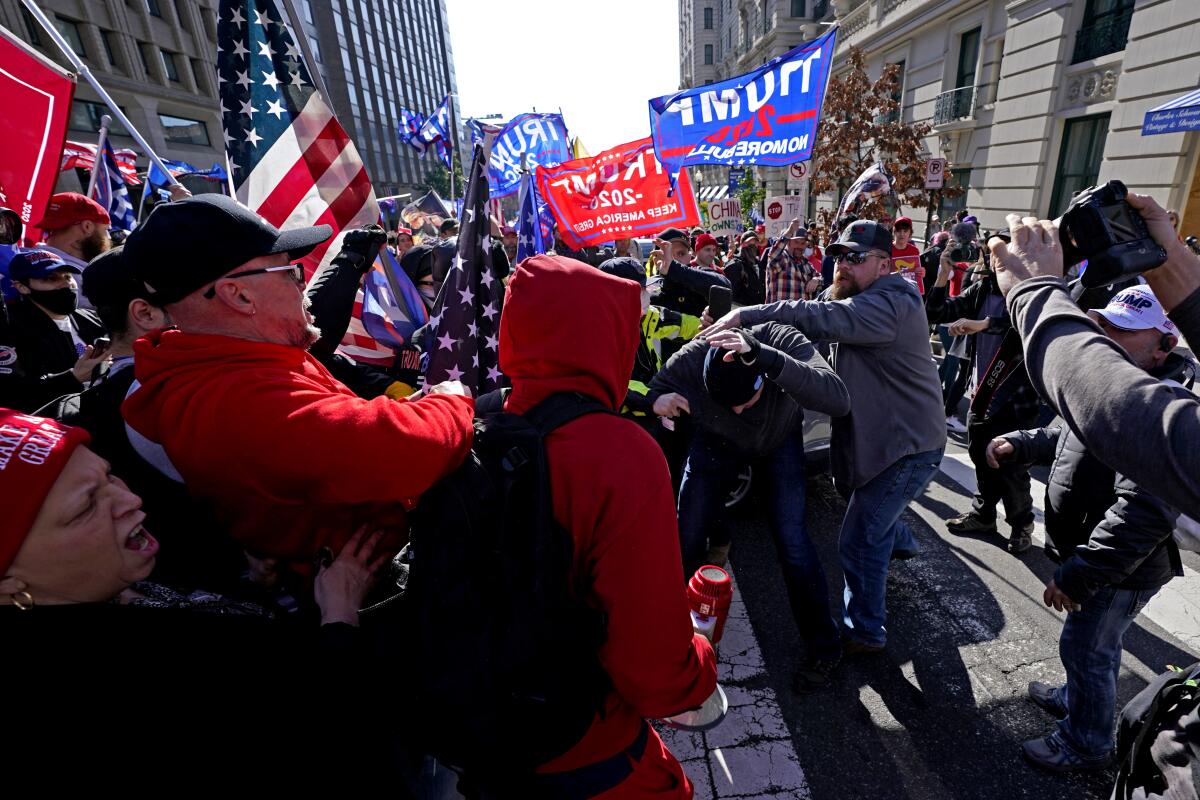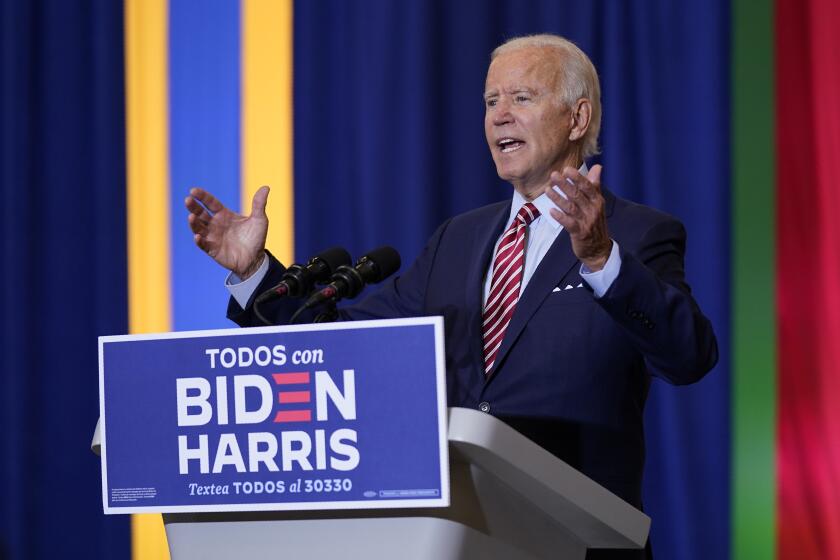Column: Imagine if white vigilantes and ‘illegals’ united for their common cause

The first year of Donald Trump’s presidency, I interviewed a 78-year-old man who regularly patrolled his border-adjacent property in the rural California town of Boulevard, wearing a bulletproof vest and carrying an AR-10. “It is my duty to protect my country from people invading it,” Bob Maupin told me.
The retired mechanic and self-described “vigilante” was grieving his wife, who had died the previous summer. He choked up remembering her. “She was my life,” he said. He told me that if Trump hadn’t won in 2016, he was planning to take part in an insurrection. He wouldn’t share details except to say he’d risk everything. “I’m gonna die, and I don’t care how,” he said. “Except I’m not going to die a slobbering old man in a rest home pushing a walker. I’m going out in a firefight.”
Opinion Columnist
Jean Guerrero
Jean Guerrero is the author, most recently, of “Hatemonger: Stephen Miller, Donald Trump and the White Nationalist Agenda.”
He died (not in a firefight, but of cancer) a year before hundreds of insurrectionists stormed the Capitol on Jan. 6, 2021. But I remembered him that day. I remembered how, after the videographer stopped recording him, Maupin’s eyes had locked on mine as he deadpanned: “I might have to kill you.” I couldn’t reconcile his danger with my empathy for him: a man desperate for purpose in a conspiratorial underworld, not entirely unlike my father, a Mexican immigrant whose story I’ve documented.
Maupin and I had more in common with each other than either of us would with Trump or any other tax-dodging billionaire who pits people against one another: white against Black against brown. Imagine Latina matriarchs and other guerreras teaming up with white vigilantes like Maupin in a common struggle. Such a class-based multiracial coalition would be unstoppable. And strange as it might sound, the constituent groups’ main goals would be compatible.
A bill introduced by Rep. Zoe Lofgren (D-San Jose) to provide green cards for millions of undocumented people who’ve lived here for years is a critical step toward creating such a coalition. But it needs GOP support, which won’t happen without a takedown of the Trumpist fiction that frames “amnesty” as damaging to white and native-born workers.
The opposite is true. Green cards for undocumented people would allow them to demand higher wages and report employer abuses they might otherwise tolerate because they fear deportation. It would be a victory for labor, making it harder for employers to bust unions and exploit with impunity by invoking Immigration and Customs Enforcement. “The more people can stand up for themselves and make sure that wages are not undercut, then the better off anyone is,” Lofgren told me.
He has executive authority to stop deportations, expand legal status and much more.
One central complaint of alienated white factions echoes that of undocumented workers: feeling, and being, shut out of the American dream. An empowered workforce would tear down elites’ walls to that dream.
“Renewing Immigration Provisions of the Immigration Act of 1929,” or House Resolution 8433, would update existing law so people with “good moral character” who’ve been here at least seven years could apply for green cards. It would protect as many as 8 million people by updating what’s called the “registry date,” changed four times since the law was created. The last time the date was updated was in 1986, to 1971: If you arrived before then, you can register for a green card. But millions have come since. Many are “essential workers.” Many are parents of U.S. citizens.
The bill is short and simple, creating a rolling seven-year window for green card registry, and should be passed during the lame-duck session of Congress after the midterm elections. Meanwhile, our leaders must puncture divide-and-conquer mythologies dating back to the colonial era, when elites conspired to discourage poor white people from uniting with enslaved Black people.
Green cards for undocumented Americans, as proposed in HR 8433, would boost gross domestic product by hundreds of billions of dollars and expand on the tens of billions in taxes these workers already pay. They’d open the door to suffrage so that many could join the fight for livable wages and healthcare, and perhaps could even put a stop to the parasitic foreign policies that have displaced so many people in the global south.
GOP politicians were once open to protections for undocumented people; the last major legalization bill was passed under the Reagan administration. But these days, most Republicans would rather be labeled racist than “pro-amnesty.”
On the right, support for immigrants has become synonymous with out-of-touch elitism, a cavalier approach toward working Americans. The portrayal distorts the truth: that raising the floor for the most abused workers benefits all workers. Some employers do use immigrants to undercut wages, but that’s a problem with the current situation, not an argument against granting legal status. The employers’ tactics work only because so many immigrants live in fear.
There was a time when the labor movement viewed immigrants as strikebreakers and job stealers, because that’s how abusive employers had used them. But in 2000, the AFL-CIO changed its position, calling for the legalization of millions of workers. The success of the Service Employees International Union’s Justice for Janitors campaign in the preceding decade showed that undocumented people are eager to link arms with fellow workers in the fight for dignity.
The registry law bill could unlock workers’ full organizing potential.
But a corporate class in the Democratic Party has long conspired with the GOP to avoid that outcome, pursuing “guest worker” and other precarious labor programs rather than emancipation for those with deep roots here.
MAGA patriots have been led to perceive undocumented Americans as enemies. But as Lorena Gonzalez, head of the California Labor Federation, told me: “A construction worker or electrician making six figures has more in common with an undocumented farmworker than they do with a guy trying to get to Mars.”
Politicians should be shouting this from the rooftops, on talk shows, during campaign events and on social media.
Green cards for undocumented workers would set all workers free.
More to Read
A cure for the common opinion
Get thought-provoking perspectives with our weekly newsletter.
You may occasionally receive promotional content from the Los Angeles Times.













